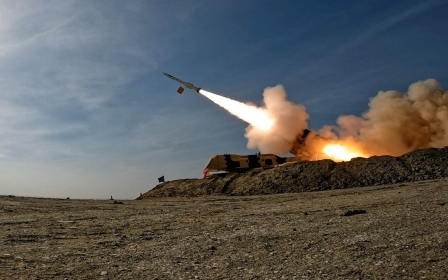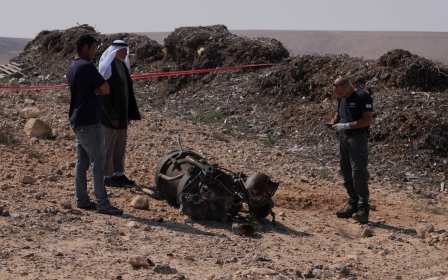US lawmakers push legislation to punish Iran after strikes on Israel

Following Iran's retaliatory attack on Israel over the weekend, Republican lawmakers in the US quickly moved to consider for a vote more than a dozen bills targeting Iran and its allies with sanctions, travel bans, or condemning pro-Palestinian activists.
On Monday, Republican Congressman Steve Scalise released Congress' weekly docket of legislation to be considered for a vote.
Of the 18 bills to be considered, 15 of them were measures condemning or sanctioning Iran and Palestinian groups in Gaza, while the remaining three dealt with Iran's allies in the Syrian government and the Houthi movement in Yemen.
The new legislative schedule was a shift from what had been originally planned for this week, which Scalise said was in direct response to the retaliatory strikes by Iran on Saturday.
"In light of Iran's unjustified attack on Israel, the House will move from its previously announced legislative schedule next week to instead consider legislation that supports our ally Israel and holds Iran and its terrorist proxies accountable," Scalise, the House majority leader, said in a statement.
Stay informed with MEE's newsletters
Sign up to get the latest alerts, insights and analysis, starting with Turkey Unpacked
"The House of Representatives stands strongly with Israel, and there must be consequences for this unprovoked attack."
The legislation being pushed forward includes a bill condemning the Iranian strike and showing support for Israel "as it defends itself against Iran’s attack and seeks to re-establish deterrence against Iran".
Several bills call for sanctions on Iran, and one calls on the European Union to designate Iran's Islamic Revolutionary Guards Corps as a terrorist organisation.
One piece of legislation includes a call for the Biden administration to ban individuals with American passports from travelling to or from Iran.
The National Iranian American Council said the bill would harm Iranian-American dual nationals, banning them from being able to visit their families back home.
Another bill condemns the phrase "‘from the river to the sea, Palestine will be free", calling it antisemitic. The phrase is often used at pro-Palestinian rallies and refers to liberating the territory that exists between the Jordan River and the Mediterranean Sea in historic Palestine.
Many Israelis and pro-Israel US lawmakers claim the chant effectively calls for the destruction of Israel.
On Saturday, Iran launched an attack against Israel consisting of around 170 drones, 30 cruise missiles and 120 ballistic missiles, according to Israeli officials. The attack was in response to a 1 April air strike on Iran's consulate building in Damascus, Syria, which killed several people including three top Iranian military commanders.
A small number of ballistic missiles got through Israel’s defences, hitting the Nevatim airbase in southern Israel. Hagari said it caused light structural damage to the facility, but the base was still functioning.
A young Palestinian Bedouin girl was critically wounded when shrapnel from an intercepted ballistic missile hit her family home near Arad, in the southern Negev region.
The drones and missiles were intercepted by Israel, the US, the UK, France and Jordan.
Israel has vowed to respond to the attack. In a phone call between US President Joe Biden and Israeli Prime Minister Benjamin Netanyahu, Biden said that Washington would not support any offensive attack on Iran.
But Republicans in Congress have openly supported an Israeli response to Iran.
"I, along with many others in the United States, will do our best to support you," Lindsey Graham, a Republican senator from South Carolina, said about a possible Israeli attack against Iran.
Scalise, the House majority leader, said in a post on X that Tehran "must know there will be consequences for these attacks".
"The United States must stand strongly with our greatest Middle East ally as they defend themselves against Iran," he said.
Middle East Eye delivers independent and unrivalled coverage and analysis of the Middle East, North Africa and beyond. To learn more about republishing this content and the associated fees, please fill out this form. More about MEE can be found here.




.jpg.webp?itok=6E24njAZ)
